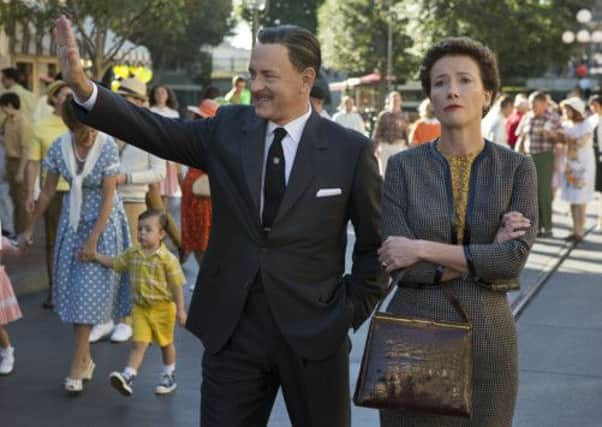Film reviews: Saving Mr Banks | Carrie


Saving Mr Banks (PG)
Director: John Lee Hancock
Running time: 125 minutes
* * * *
On general release from Friday
For 20 years, Walt Disney tried to obtain the rights to film her children’s books, only to be buffeted back by her refusals.
John Lee Hancock’s film begins in 1961, when Travers (Emma Thompson) faces money problems and agrees to be blown east to Hollywood for two weeks to discuss a film with Walt Disney (Tom Hanks) and his creative team. Suspicious of Disney’s jaunty notions, she has a list of verbotens, including no songs, and no silly cartoons.
Advertisement
Hide AdConfronted with an immovable objector, Disney’s irresistible force of a paterfamilias is bewildered that she fails to be enchanted by his magic kingdom. Offered a hotel room stuffed with Disney toys, she dumps an oversized Mickey Mouse into a corner muttering: “You can stay there until you learn the art of subtlety.”
Thompson has fun with the film’s crafted repartee, especially when dimming the zeal of the songwriting Sherman brothers (Jason Schwartzman and BJ Novak). Also terrific is a late sequence where Disney and Travers confront their paternal issues.
But Saving Mr Banks is awfully uneven. Many spoonfuls of sugar are contained in the droll barbed battles between Mrs Travers and all-comers in Los Angeles, but the medicine lies in the clumsy flashbacks to her childhood in Australia. Designed to reveal why the writer is so protective of Poppins, they sketch a long-suffering mother (Ruth Wilson), a charming, irresponsible father (Colin Farrell) who drinks to numb the boredom of working for a bank, and the emergence of a spitspot proto-Poppins. It’s necessary information, but the film noticeably flattens in the Outback.
This is also another film that flatters Hollywood. Besides floating the notion of storytellers as healers of private pain, this BBC/Disney co-production glosses Disney and Travers as reinvented people – an Australian who speaks like Lady Bracknell, and a hardscrabble Missouri boy who becomes a folksy entrepreneur – both heading towards a place of mutual respect.
This isn’t how the real Travers remembers it. Also, you’ll search in vain for signs of her bisexuality. Meanwhile, Walt’s despotism is given a benevolent sheen that doesn’t touch on his sideline as an FBI snitch, or his anti-Semitism. Mind you, the real Disney was genuinely fond of the Jewish Sherman Brothers, and the film doesn’t fall over itself to insert a sequence demonstrating what a mensch Disney was to them.
Saving Mr Banks shapes up as this year’s The King’s Speech, the sort of determinedly feelgood period piece that won’t delve too deeply into the monarchy’s actions during that Hitler business, or the boss of a film studio who spent a lot of his time executively rubber-stamping high-profile moneyspinners. Yet while you could scoff at the gaps in historical truthfulness and excessively string-tugging score, the picture eventually overcomes its own manipulativeness and sentiment with a great collective cast and sheer cumulative effect. It’s not perfect, but it has more emotional directness than you might expect.
Carrie (15)
* *
On general release from Friday
Advertisement
Hide AdTHINGS you don’t really need: pre-ripped jeans, yogurt makers, and a remake of Carrie. Back in 1976, Brian DePalma’s operatic movie about the horrors of adolescence won Academy Award nominations for the two lead actresses. In 2013, that’s about as likely as Lady Gaga netting the Man Booker.
Miscasting is one of the first issues; At 16, Chloe Grace Moretz is arguably more age appropriate to play friendless misfit Carrie White than Sissy Spacek, who was 26, and married when she took on the role. But Moretz doesn’t have Spacek’s delicate gawkiness, and no amount of ferocious slouching can disguise that this Carrie is almost as much of an alpha hottie as her persecutors, once she sorts out her hair.
Advertisement
Hide AdEven more awkward is the film’s effort to turn the volume up to 11 on Carrie’s Bible-bashing mother. Piper Laurie had already played Mrs White as a religious nutjob, but Julianne Moore’s edition has even less finesse as a self-harmer obsessed by body shame, who locks her daughter up in a prayer closet. Has much else changed for Carrie in Kim Peirce’s update? The bullies now use their phones to capture Carrie’s embarrassment when puberty hits her in the school showers, and before hitting the revenge track, our heroine learns how to harness her telekinetic powers on Google. Yet the film is otherwise halfhearted about hipping up to modern cyberbullying, and too reliant on cheap effects
and even cheaper horror shocks. One hoped for something more affecting from the director of Boys Don’t Cry.